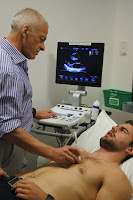Team GB Mogul Skier and Olympian shares secrets of how to care for your joints as you ski this winter
•
Team GB Olympian treated at Progress, Spire Cambridge Lea Hospital
•
Athlete and experts share tips on how to avoid injury on the slopes in 2016
Cambridge athlete, Ellie Koyander is a Team GB Winter Olympian and competes in the ultimate extreme winter sport – freestyle mogul racing. She is in peak fitness and competes at the highest levels of international sport, finishing 2nd overall in Europe last year. She gained seven podium positions on the European Cup Tour and is currently pushing herself further in 2016 for the World Cup season.
Ellie explains: “My discipline can be very grueling on the body, especially when things don’t go as planned. It involves skiing against the clock through a course of icy, bumpy, terrain (the moguls) whilst also pulling ‘tricks’ such as a 360 or backflip off the two jumps in the middle of the course. The ever changing weather conditions and snow consistency can quickly change from bullet-proof ice to sloppy, slushy snow which can all make for some spectacular crashes at any moment, but unfortunately this may mean injuries too.”
Ellie was recently treated at Progress, the Cambridge Centre for Health and Performance, Spire Cambridge Lea Hospital, by Specialist Sports Physiotherapist Lauren Bradshaw.
As Ellie continues: “Lauren has helped me through both shoulder and back injuries as well as other niggles that I’ve had along the way. Being able to work with someone who understands competing at the top level is ideal. Lauren always goes out of her way to make sure I’m feeling as good as possible and know the next steps I need to take. The facilities that they have at Spire are also top of the range and it’s a very professional and friendly clinic, I can’t thank or recommend them highly enough.”
Lauren is not only a physiotherapist but is also an elite athlete in her own right, competing in Iron Man competitions and triathlons. She was an international skater before training as a physiotherapist and becoming the youngest physio for Team GB at the London 2012 Olympics. Lauren clearly understands the pressure of competing and staying fit mentally as well as physically. “As I continue to learn about my own body and the injuries I experience, it helps me to be more empathetic towards my patients and athletes and to better understand their issues”.
Whilst we aren’t all skiers of Olympic standard, if you are considering a ski holiday, try to avoid injuries this season. The most common seen by the team at Progress includes:
Anterior Cruciate Ligament rupture (ACL) of the knee; Meniscal (cartilage) damage and wrist sprain injuries, mainly for snow boarders.
To reduce the risks of accident and injury at any level, following a ski fitness program before you go away is vital.
“At Progress we offer a Snow active assessment where I examine your current fitness and strength abilities in relation to snow sports. This enables me to create a unique and bespoke pre-habilitation program to help build muscular endurance and control”.
Here are a few simple exercises from Lauren that anyone can do. They promote core strength and promote muscle groups:
•
Ski sit – either with your back flat against a wall and knees bent to 90 degrees or with a swiss ball behind your back up against a wall – hold a static position for 30 seconds and increase the time to increase the challenge
•
Swiss ball squats - put the swiss ball in the hollow of your back up against the wall and use the ball to perform a squat. Repeat 3 x 20 repetitions
•
Single leg balance on a cushion/wobble board – can help to improve dynamic stability at the knee joint - aim for 3 x 30 seconds on each leg. Increase the challenge by closing your eyes!
•
Front plank – keep your elbows under your shoulders, tight squeeze of the bottom muscles and core and hold the position for 30 seconds increasing to 90 seconds. Repeat x 3.
“Try to repeat these exercises 2-3 times per week for 4-6 weeks on the run up to a ski trip in order to ascertain sufficient changes!”
And if the worst comes to the worst and you do pick up an injury, it’s important to seek professional help when you return, as Ellie has:
“It’s been fantastic to work with Lauren at Progress, she has helped me enormously through both injuries”
Ellie Koyander
Ellie is the GBR No.1 Female Freestyle Moguls Skier and currently competes on the FIS Freestyle Moguls World Cup (highest level).
Ellie competed at the 2010 Vancouver Winter Olympic Games at the age of just 18 taking on the most experienced and elite athletes that the world has to offer. Originally a slalom racer, she always had a talent for moguls where the discipline requires not only full out technical skiing, but also gymnastic precision in the air. Moguls is the only freestyle discipline to combine 'tricks' with racing flat-out against the clock.
Ellie follows the snow around the world throughout the year, training throughout spring and summer in the USA and Chile. Ellie is now working towards the 2018 Winter Olympic Games in PyeongChang.
Lauren Bradshaw – Specialist Sports Physiotherapist
Lauren graduated with a degree in Physiotherapy from the University of Nottingham in 2005. She later completed a Master’s degree in Sports Injury Management at Sheffield Hallam University in 2015. She has worked in Private Practice but predominantly within Elite Sport. Lauren spent 4 years working as the Great Britain Handball Lead Physiotherapist on the run up and during the London 2012 Olympic Games. Lauren is still a contracted Physiotherapist for Great Britain Diving, Boxing and Bobsleigh squads and spends time looking after athletes competing and training across the World.

